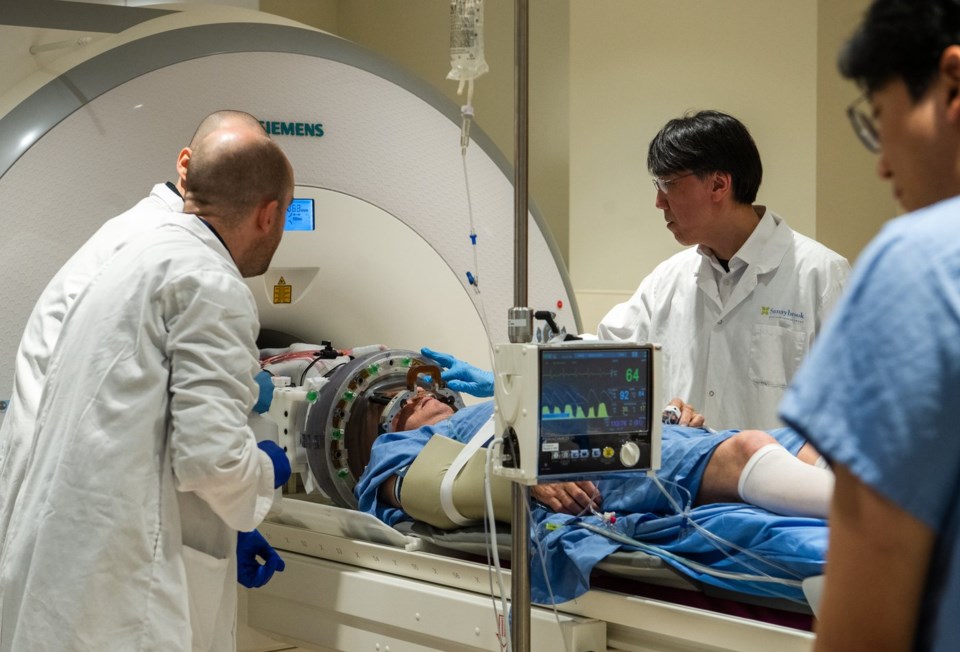TORONTO — Standing in an MRI control room packed with fellow ALS researchers, Dr. Lorne Zinman excitedly points to the brain scan on his phone.
There's a white spot on the image, right where Bill Traynor's motor cortex is. The 70-year-old patient is lying on the MRI bed with his head inside a dome that sends focused ultrasound waves to his head in the experimental trial.
The white spot signals that the immunoglobulin Traynor received intravenously has crossed the blood-brain barrier into the precise area the researchers wanted it to go.
In an interview just before the procedure, Zinman talked about how significant this result would be in the search for treatment of the devastating neurological disorder.
"This is a major milestone," the neurologist and director of the Sunnybrook Health Sciences Centre's ALS clinic said Wednesday.
"Now that we have the capability of opening up the blood-brain barrier to exactly target where ALS starts, I'm really excited about the future."
Traynor is the first of six patients in a Phase 1 clinical trial to determine the safety of administering drugs through non-invasive ultrasound waves to ALS patients. He's the world's first ALS patient to receive a drug this way, said Zinman, who is co-lead investigator of the trial.
Sunnybrook researchers have previously studied the experimental procedure, called focused ultrasound, for patients with Alzheimer's disease, and those with essential tremor, a neurological disorder that causes uncontrollable shaking.
"The blood-brain barrier is there to protect us, so it keeps viruses, bacteria (and) toxins outside the brain," said Dr. Agessandro Abrahao, co-lead investigator of the clinical trial and Traynor's neurologist at the Sunnybrook ALS clinic.
The problem is that it also blocks access to the brain for drugs that could potentially treat ALS.
Temporarily opening the barrier to let those drugs through is a solution, Abrahao said, noting that it's critical that the barrier closes after the therapy is delivered.
Traynor's day began with an intravenous infusion of immunoglobulin, an antibody therapy. He also received an injection of microbubbles.
Researchers then placed a helmet, invented by Sunnybrook scientist Dr. Kullervo Hynynen, on Traynor's head. The helmet has 4,000 transducers that deliver focused ultrasound waves that cause the microbubbles to expand and contract in the small blood vessels in a targeted area.
Those expansions and contractions open the blood-brain barrier in the precise spot where the immunoglobulin circulating in the blood needs to get through.
Traynor laid down with his helmeted head inside an MRI machine so that the research team could see in real time that the focused ultrasound targeted the correct part of the brain.
In future trials, they hope to eliminate the need for the MRI by personalizing a focused ultrasound helmet for each patient's brain where the target points are pre-set and the MRI imaging isn't needed during the procedure.
"MRIs sometimes are limited resources. They're (also) difficult for patients. Imagine being in a tiny tunnel for a long period of time," said Abrahao.
Traynor tolerated the whole procedure beautifully, both Abrahao and Zinman said. Afterward, his blood-brain barrier closed as hoped and he was expected to be discharged from hospital Friday.
The researchers emphasized that this was a very early-stage trial and will not result in a treatment for ALS. Later stage trials, with more participants, will be needed.
But it's an important step, they say, because it will allow them to start testing different drugs that show promise.
Zinman and Abrahao are constantly reminded of the urgent need to find a drug. Their ALS clinic cares for about 700 patients. They're expected to survive about three to five years after their first symptom.
"ALS is a horrible, terminal, incurable neurodegenerative disease that results in the progressive decline of motor neurons in the brain and spinal cord," Zinman said.
"Sadly, we have about three or four deaths a week in our clinic alone, and it's awful. Literally, thousands of patients have died on my watch. And I think about that every day and how we haven't yet had major interventions to change that," Zinman said.
For this trial, they decided to use immunoglobulin because it suppresses inflammation, he said.
"We know that the immune system is not normal in ALS. We know that it shifts to sort of a pro-inflammatory state where the immune system is assisting in the destruction of these motor neurons," he said.
Researchers actually tried immunoglobulin in the 1990s as a possible treatment for ALS, but it showed no effect, he said.
But it wasn't given a fair shot, he said, because less than 0.01 per cent of a dose can cross the blood-brain barrier and reach the motor cortex.
The researchers will be looking for biomarkers of inflammation in Traynor's blood and cerebrospinal fluid to see if the immunoglobulin had any effect, Abrahao said.
They've cautioned Traynor that this trial is not expected to result in any form of treatment.
But Traynor still sees the study as a source of hope.
"It's kind of exciting to be a guinea pig," he said.
He said his first symptom appeared about 10 months ago while walking down the street with his ex-wife.
"She said, 'Bill, your right foot is kind of like slapping the ground.' And being a guy, I said, 'Nah, it's nothing. It'll go away.'"
"It didn't go away," he said, noting that he now uses canes to walk.
Getting an ALS diagnosis felt like a "death sentence," Traynor said.
But he's determined to continue living his active life and not give up.
"I'm one of these kinds of guys that I'm super positive."
This report by The Canadian Press was first published May 9, 2025.
Canadian Press health coverage receives support through a partnership with the Canadian Medical Association. CP is solely responsible for this content.
Nicole Ireland, The Canadian Press




